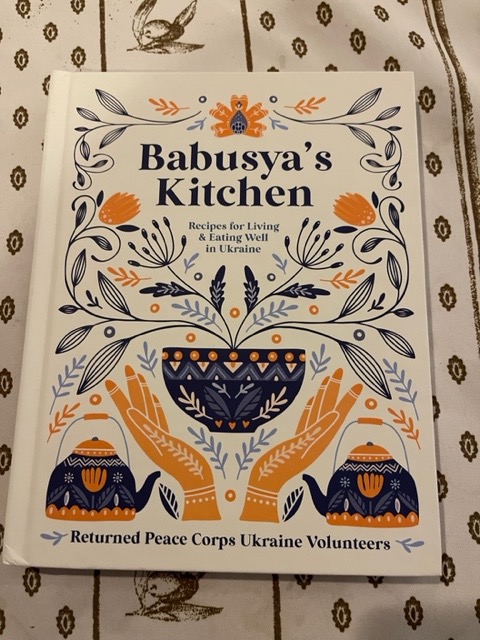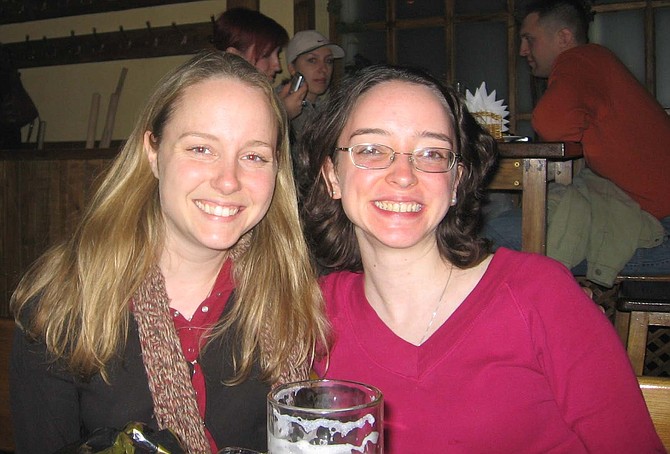Virginia Pasley and Sandra Jacobs have been friends since they served in the Peace Corps together in Ukraine in 2007. Sandy and her husband Eric lived in Vinnytsia, the capital of the region, and Pasley lived in the small town of Bratslav, about an hour away.
Now both live in Arlington where Pasley is a teacher at Wakefield High School and Jacobs is in the Foreign Service. But both of them keep close ties with their host families and other friends in Ukraine. Pasley visited her host mother in 2013, speaks with her every several months and recently arranged to send her some funds for long-awaited cataract surgery. “I got someone to help me send the money because my Ukrainian is imperfect.”
Pasley says the families in their host cities are not in the direct line of fighting but there have been bombings. “And those who stayed say it is very stressful, an exhausting situation. They are constantly on guard.”
Pasley says that when they were in Ukraine Jacobs was in the geographical area that spoke Russian and she learned Ukrainian. Now she says even though Russian may be their first language, people are now speaking Ukrainian. “It is the result of the invasion. Things have changed a lot.”

Jacobs explains Ukrainian farmers are very productive and incredibly resourceful. Many people keep gardens, even those who live in high-rise apartments. She says that at times, it felt like her host mom canned enough food to feed five families, storing it in the basement of her 11-story apartment.
“Even after the February 24 invasion, Ukrainians demonstrated their resilience by proceeding with the spring planting. They have a long-term focus.”
Jacobs says food is a unique relationship; everything there is truly farm to table. “My first host mother was an incredible cook. I helped her plant potatoes and work in the field. Many people in the city still have family in the towns and the villages. During harvest you help your family members.” She adds, “they take pride in making nourishing food for your body from scratch.”
One of her favorite dishes is a vinehret. “It’s not a salad dressing. It’s beet and carrots and pickles you’ve made and dill and beans. It’s incredibly wholesome and beautiful. They make sure they are feeding the body.” And borshch can have many variations with the green/zeleniy a favorite.
The cookbook explains every family had a secret ingredient that they added to their version of the soup. Jacobs says this week at the Lubber Run Farmer’s Market in Arlington they had sorrel. “This time of the year in Ukraine everyone gets excited because it makes this amazing borshch with chicken, dill, potatoes and sorrel —not your traditional borshch.”
Pasley says one of her favorite foods was varenyky—dumplings stuffed with cabbage. Jacobs adds when Ukrainians were sick they swore by honey-pepper Vodka, garlic and falo (pig’s fat). It seemed to work.
Jacobs explains that when Peace Corps volunteers arrive in a country, they are given a cookbook guide “to help them stay healthy and learn to live in the local environment.” She says what they received was a grassroots version printed off as a Word document and spiral bound.
A volunteer who lives in Texas got the idea to expand the cookbook, and the idea just took off. Former Peace Corp members around the United States put it together using Goggle doc. Jacobs who was one of the organizers says, “We solicited stories and photos from all over and published the entire book that way. It’s kind of amazing.”
Last year someone got the idea to sell the cookbook as a fundraiser for Ukraine. Pasley says they have sold about 3,000 copies so far. “In March my choir (the Capitol Hill choir) gave a concert in Washington D.C. featuring all Ukrainian composers. We sold the cookbook after the concert.” Pasley adds that Ukrainians love music and she has been happy to share videos of the Chorale’s Ukrainian pieces on social media to let people know that we are thinking about them every day and have not forgotten what Ukraine is going through.
The proceeds so far have yielded over $40,000 which is used to make small targeted mini-grants of $1,500 for identified needs in Ukraine such as firewood for a communal kitchen, kitchen equipment for a communal kitchen and to keep the lights on in a school. “The grants are when we know the person—a direct person to person connection.”
Jacobs says “the book really was a way for those of us not there working on the front lines in Ukraine to focus on their cultural heritage preservation. There are no Peace Corps volunteers now “but it’s a way to keep the relationship going.” Putin says Ukraine doesn’t deserve to exist as a country so we focus on telling the story of Ukraine culture and food.
Babusya’s Kitchen is dedicated to the babusyas or grandmothers of Ukraine who work through the day to provide for their families and keep track of friends and neighbors. The dedication of the book says, “Peace Corps volunteers were told that if they feel unsafe, find a babusya and sit next to her. Nobody will bother you when you’re near someone who is known to be so caring and so fierce.”
The cookbook ventures beyond the recipes to explain the Ukrainian ingredients and substitutions, a quick guide to the Ukrainian language so you don’t confuse the word for cabbage roll with the word for a group of young boys. Some recipes like mashed potatoes sound familiar and others like kholodets (with 1 meaty pig leg from the knee and down), maybe not so much.
To order the cookbook Babusya’s Kitchen Cookbook (allianceforukraine.org).
